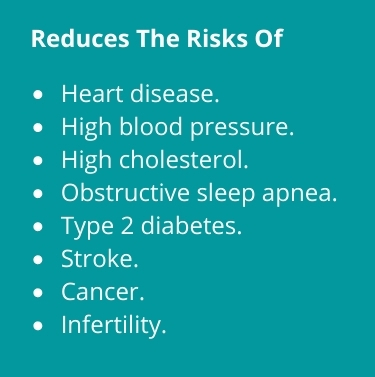Weight Loss with Gastric Sleeve Surgery
Weight loss with gastric sleeve surgery
If you’ve ever suffered from excess weight gain, you’re probably familiar with the idea of gastric sleeve surgery. For those not familiar with the procedure, it is a surgical process that reduces your stomach size to induce weight loss and a procedure we offer at The Health Store Turkey. As a part of the process, a large part of your stomach is removed. Your stomach will ultimately assume a smaller, tubular shape. As the stomach’s capacity is now reduced, your appetite will be significantly suppressed, and you will lose weight quickly.
The Surgical Process
The gastric sleeve process is moderately complex but safe and effective. Typically, the surgeon will perform a keyhole or laparoscopic surgery to remove parts from your stomach. Before starting the process, your medical professional will administer general anaesthesia. Once you are unconscious, your surgeon will begin safely removing sections of the stomach. The rest of your stomach will then be grafted using surgical equipment. This surgery completely transforms the shape of the stomach, giving it a narrower, tubular form.
After the procedure, you will have a significantly smaller stomach and will require less food to satisfy your appetite. A substantially reduced calorie intake will make it much easier for you to lose weight and maintain a healthy physique.
Candidates For Gastic Sleeve
Patients of various profiles may consider gastric sleeve surgery. The most common candidates are people who have been grappling with obesity for a long time and whose BMI score is over 35. An individual of this profile may have tried other treatment methods with limited success. Diet and exercise plans may also have failed to meet the necessary targets. In this case, gastric sleeve surgery can be an effective and relatively quick option for significant, long-term weight loss.
Gastric Sleeve surgery is also an excellent option for individuals coping with conditions such as type 2 diabetes and excessively high blood pressure. While gastric sleeve surgery is an effective weight-loss method, you must still maintain a healthy diet and exercise routine in order to maintain its benefits in the long term. A healthy lifestyle will also benefit you with regard to any other underlying conditions related to excessive weight.
In the following section, we’ll discuss how gastric sleeve surgery is performed, its benefits and risks, and who is eligible for the procedure.
Overview
A gastric sleeve procedure is a form of targeted weight-loss treatment involving the removal of part of the stomach. But how exactly does removing parts of your stomach help you lose weight? Is weight loss with gastric sleeve a reliable and effective treatment method?
Gastric sleeve surgery is a safe, efficient and highly effective treatment method. It can have a substantial impact on the patient’s health and well being in a relatively short time-frame. By reducing the volume of the stomach, the gastric sleeve makes it less susceptible to stretching. Your appetite is reduced so you require less food to feel full. Your body also requires less energy to process food and carry out other functions. This means you can be more productive and energetic with a lower food intake. This means that gastric sleeve surgery doesn’t just reduce your weight, but can dramatically improve your overall quality of life.
Gastric sleeve surgery removes the fundus of the stomach. The fundus is involved in the production of ghrelin, a hormone that significantly impacts appetite. Typically, your body produces ghrelin in the fundus. The removal of the fundus reduces ghrelin production in a safe way, therefore reducing your appetite significantly.
Gastric sleeve surgery can also transform your dietary preferences. Some patients report a reduced appetite for sweet or fatty foods, processed foods or alcohol after gastric sleeve surgery. This makes maintaining a healthy diet much easier which better the chances of weight loss in the future.
Gastric sleeve surgery removes the fundus of the stomach. The fundus is involved in the production of ghrelin, a hormone that significantly impacts appetite. Typically, your body produces ghrelin in the fundus. The removal of the fundus reduces ghrelin production in a safe way, therefore reducing your appetite significantly.
The procedure can also transform your dietary preferences. Some patients report a reduced appetite for sweet or fatty foods, processed foods or alcohol after gastric sleeve surgery. This makes maintaining a healthy diet much easier which betters the chances of future weight loss
How Much Weight Can You Lose With Gastric Sleeve?
While the gastric sleeve is primarily used to support long-term weight loss, you are also likely to experience weight loss in the short term. In the period immediately after the surgery, many patients lose a significant amount of weight. The amount of weight loss in the first year after surgery can vary depending on several factors. However, the average weight loss during this period is between 40 and 45 kgs. Some patients lose more than this, but it’s a useful reference point for anyone considering the procedure.
Ultimately, the extent of your long-term weight loss will largely depend on diet and exercise. You must support the results of gastric sleeve surgery in the long term by maintaining a healthy, balanced diet and getting regular exercise. Maintaining a healthy lifestyle will help you to achieve and maintain your weight loss goals. Your doctor will prescribe an aftercare routine for the period after surgery and a long-term plan to maintain a healthy weight.
In almost every case, a gastric sleeve procedure leaves the patient with a healthier body and an improved quality of life in a relatively short time-frame.

Can I Lose Weight In The Long Term With Gastric Sleeve?
One of the most common queries about gastric sleeve is whether the weight loss results will be permanent. Permanent weight loss can absolutely be achieved using a gastric sleeve. However, as with the short-term results, this comes with certain conditions. You cannot depend entirely on the procedure to ensure a healthy weight in the long term. You must support the effects of the procedure with your lifestyle choices.
After the surgery, you must closely follow the dietary guidelines and exercise advice of your medical team. In the longer term, you should also make sure to stick to relatively strict dietary and exercise routines. If you do not, you may fall back into a cycle of unhealthy eating, and your weight may increase again. Exercising regularly will improve your body’s overall function, helping you to process nutrition in a healthy and sustainable way.
You may still end up gaining some weight if the gastric remnant is stretched or if your ghrelin level is increased. While a minor increase in weight should not be problematic, a significant or consistent increase will be. To prevent this, always go by your doctors’ guidelines and follow their advice carefully.
Why Should You Opt For Gastric Sleeve Surgery?
Below are the defining benefits of gastric sleeve surgery for suitable candidates.
- You lose a significant amount of weight. Patients who have undergone this surgery have experienced weight loss of as much as 1 kg per week post-surgery and 30-45 kgs overall.
- The treatment helps reduce hypertension, high blood pressure levels, gastric problems, indigestion, depression, mood swings, and a range of other physical and mental conditions.
- With a gastric sleeve, your digestive functions are thoroughly regulated. The only change you will experience is in the size of the stomach.
- The process is safe and your stomach openings remain intact. Your nerves are completely unaffected during the process.
- Since the process is laparoscopic, it is minimally invasive, and scarring is likely to be minor. The laparoscopic method also reduces recovery time.
- With a gastric sleeve, your chances of contracting complex gastric issues like ulcers are significantly reduced.
- Your inpatient hospital stay is quite short, ranging from two-to-four days.

Are There Any Risks Associated With Gastric Sleeve?
No surgical process is completely risk-free, and the gastric sleeve is not an exception. Like any surgery, it does come with some risk. Your surgeon will discuss any risk factors with you in detail. The following are the three most common risks associated with gastric sleeve surgery.
1.Blood Loss
This is the most common risk associated with gastric sleeve surgery. The patient may experience heavy blood loss. In some cases, they may need a blood transfusion and another gastric sleeve procedure. In other instances, another procedure is not required.
2.Stomach Leakage
While this might sound dangerous, it is a common side-effect most individuals experience after the surgery. Stomach leakage usually means that the stomach is losing some of its contents as a result of its new form. Some patients experience this in the days following their surgery. While it is not usually serious, it may require a longer hospital stay.
3. Heartburn’s After Gastric Sleeve
If you have a history of acid reflux issues, gastric sleeve surgery may not the best option for you. People with heartburn and reflux problems may find these conditions worsening right after the operation. These patients also may not end up achieving their targeted weight loss goals. Chronic acid reflux is a potentially serious issue. This is especially true if the problem persists in your lower gullet. If you experience chronic acid reflux, you should discuss the problem with your doctor, particularly if you are considering a gastric sleeve procedure.
Who Is Eligible For Gastric Sleeve Surgery?
Gastric sleeve surgery is a reliable and effective option for many people. However, not everyone is a suitable candidate. Here, we’ve listed the most common eligibility requirements for gastric sleeve surgery.
1.BMI
This is probably the most significant factor in a patient’s eligibility for gastric sleeve weight loss surgery. If your BMI is above 40, you are considered clinically obese. In this case, gastric sleeve surgery may be recommended.
If your BMI is between 35 and 40, your doctor may also recommend a gastric sleeve depending on some other factors. In this range, other treatment methods may be preferable, but your doctor will carry out a thorough assessment before making a recommendation.
In some cases, patients with a BMI of 30-35 may also be suitable candidates for gastric sleeve surgery. A medical professional will carry out a full assessment of medical history and other relevant factors. They may recommend lifestyle changes or other treatment methods. They may also recommend a gastric sleeve procedure with a detailed aftercare program. The primary goal of a medical assessment for the gastric sleeve is to identify whether the benefits will be worthwhile and safe for the patient.
2.Weight Criteria
When you discuss a gastric sleeve procedure with a medical professional, the first thing they will consider will be your BMI. After that, they will focus on your total weight. Your total weight is calculated in relation to your height.
The efforts you have already made to lose weight may be the deciding factor in whether you are a suitable candidate for gastric sleeve. If lifestyle methods such as diet and exercise have failed to have the desired impact, your doctor may recommend other treatment methods. If these have also been unsuccessful, gastric sleeve surgery may be recommended.
3.Additional Requirements
Beyond these two primary factors, some others will also be assessed in deciding if you are a suitable candidate.
Age
Candidates for gastric sleeve are usually aged between 18 and 60. In some cases, however, the surgery may be performed for teenagers or individuals older than 60 if the benefits are deemed significant enough.
Medical History
A full assessment of a patient’s medical history and general health will be carried out before deciding if they are a suitable candidate for gastric sleeve. Some medical conditions may make gastric sleeve inadvisable or excessively risky.
Patients who do not have underlying conditions that are unrelated to their obesity are less likely to be recommended gastric sleeve surgery. Certain conditions may interfere with the surgical process or aftercare treatments. Other medical conditions may mean that you are not a suitable candidate for gastric sleeve surgery even if you meet the other criteria.
Nicotine Intake
If you smoke, you should make sure to discuss this with your doctor before deciding on gastric sleeve surgery. You will probably be required to stop smoking for around two weeks before surgery. You may also be asked to continue this pause for a period after surgery. If you are willing to do this, the procedure will probably be an option for you provided there are no other complicating factors.
Emotional Readiness
It can sometimes be overlooked, but emotional readiness is a crucial aspect in deciding if you are a suitable candidate for gastric sleeve surgery. Your doctor will discuss all aspects of the treatment in detail and will fully assess your medical history. If you have experienced any mental health issues, they will discuss this with you. If you are on medication for conditions such as anxiety or depression, you may be prescribed additional medication to test your reaction. Your doctor will only recommend surgery if they think you are mentally and emotionally, as well as physically, suitable for it.
How Can I Become Eligible for Gastric Sleeve Surgery
You can give yourself the best chance of meeting the eligibility requirements for gastric sleeve surgery by following the below steps.
Step One
For your first step, we recommend consulting a physician about your BMI. You should also ask them to conduct a thorough full-body checkup and to assess your past medical records to check if you have any underlying conditions related to obesity.
Step Two
Once you have consulted with a doctor, contact your insurance provider and ask them if you qualify for the treatment. Clarify your status and the eligibility requirements for insurance coverage. Fortunately, most insurance providers cover gastric sleeve procedures. However, as this depends on where you live, your insurance provider, and specific medical regulations, it is essential to check before proceeding.
Step Three
Once you have established that you are a suitable candidate and that you have the necessary insurance coverage, find hospitals and treatment centres in your area that provide gastric sleeve surgery. Discuss with them the benefits, risks, and recovery requirements of the procedure. Most providers offer a free first consultation, where you can discuss all of the relevant details and any concerns you may have. You can also assess how experienced the medical teams are in providing the procedure.
Step Four
During your consultation, you will be asked for your medical records and related documents. These documents will be assessed by qualified surgeons to check if you are eligible for the process. You can also discuss your eligibility concerns and the financial aspect during the consultation.
Step Five
In some instances, the surgeon may deem you eligible based on the first meeting. Alternatively, you may be asked to meet again to continue the assessment. Your suitability for the procedure and anything you need to do to become eligible will be discussed in detail.
Step Six
Once you have been assessed as a suitable candidate for gastric sleeve surgery, you must still follow some very specific instructions provided by your medical team in terms of diet, medication and physical preparation. You will be given a detailed diet plan and may be prescribed medication or asked to pause the use of some that you are already taking. You need to follow these instructions very carefully. If you fail to meet the requirements, your surgery may be cancelled up to the last moment for your own safety.
FAQ
If you are considering gastric sleeve surgery, you probably have some questions. In this section, we will aim to answer some of the most common.
What happens during gastric sleeve surgery?
The gastric sleeve procedure follows these steps:
- The surgeon makes several small incisions in the upper abdominal region. They may use advanced surgical methods to reduce visible scarring after surgery..
- Surgical devices such as endoscopes are inserted into the incisions.
- The external part of the stomach (around 70 to 80% of it) is removed.
- Stapling equipment is used to fasten the stomach in its new shape and location.
Is gastric sleeve surgery painful?
You won’t feel any pain during the surgery as you will be under anaesthesia. The laparoscopic, minimally-invasive, surgical method also reduces pain and recovery time after surgery.
Common post-surgical symptoms include a tightness around your chest, the sensation of a stitch in your upper abdomen, especially below the rib cage, aches, and mild-to-moderate pain around the tip of the shoulder.
Most post-surgical symptoms usually subside within three or four days. There may still be some discomfort after this period, but it is unlikely to limit your mobility or ability to perform regular tasks. Your medical team will also provide medication to deal with any discomfort. They will work to ensure that you are comfortable before, during and after surgery.
How long does the surgical process take?
Usually, the entire surgical process takes less than one hour. However, you will require pre-operative treatment which may take some time. You will also require a short inpatient stay after surgery so that you can recover and your medical team can monitor your progress. This stay will usually only be one or two days assuming there are no complications.
What happens after the surgery?
As the surgery uses minimally invasive keyhole incisions, any pain should subside quickly. The anaesthesia should also wear off within two-to-three hours and you will feel relatively alert again. Your medical team will prescribe medication depending on your general condition and response to surgery. You will remain in the hospital for one or two days while you fully recover and while your medical team monitor this recovery.
Will I experience hunger after surgery?
Most patients experienced reduced hunger cravings following surgery. If you maintain a healthy diet and exercise plan, you should experience healthy, consistent weight loss.
How long is the recovery process?
You can expect a quick recovery after surgery assuming there are no complications. You will be able to resume regular activities within a few days. While there may be some mild pain or discomfort, it should fade in the days after surgery. You may have to wait four weeks or more before resuming more strenuous activities such as exercise or sport. While the recovery period is quite brief, you will have to make and maintain lifestyle changes in the long term in order to truly benefit from the surgery.
Can I take other medication?
Your doctor will prescribe medication before and after your surgery. You should also inform them of any medications you are already taking. They may ask you to pause or stop your use of them before or after surgery. Your medical will provide detailed instructions around medication. You should follow them precisely.
Will I experience constipation?
Although your stool volume may change, you won’t necessarily experience constipation after gastric sleeve surgery. Lower stool volume is completely normal due to a decrease in your food consumption. However, even after the surgery, it is vital to maintain a proper intake of fibre. Your dieticians and doctor will discuss this with you.
Ideally, you should take fibre supplements after surgery. This will help you maintain healthy and consistent bowel movements after gastric sleeve surgery. If you experience any complications, inform your doctor and they will assess the issue.
When will I be able to drive after surgery?
You should not drive for at least 24 hours after gastric sleeve surgery. This is due to the effects of anaesthesia and the necessary recovery period from the surgery itself. You should arrange for someone to collect you from the hospital. You should only begin driving again when you feel fully alert and recovered, which make take two or three days.
Can people visit me?
You can have friends or family visit you during your inpatient stay after surgery. While you will not be in hospital long, it can help your recovery process to have visitors. While you may be low on energy for a few days, short visits can you maintain a positive mindset through the initial recovery phase. You should avoid having very frequent visits or large groups of visitors, however, as this can be quite draining.
Will my food habits change?
Your food habits will change substantially after gastric sleeve surgery. This is one of the main objectives of the procedure. You will have a smaller appetite so you will become full much more quickly. Your particular tastes in food and beverages may also change. In the days immediately after surgery, you may also have a reduced appetite due to the effects of the surgery and anaesthesia.
After surgery, doctors generally recommend a liquid diet for three weeks. After this, you are asked to follow a pureed diet for three more weeks. You will then gradually transition to soft food items.
You can resume eating pre-surgery food items within six to nine weeks of the surgery. As you eat, make sure you masticate thoroughly and eat slowly.
Bottom Line
You should now have a clear understanding of the gastric sleeve process and your own eligibility. If you are considering the surgery or have had it recommended to you by a physician, you should book a medical assessment and consultation.
For suitable candidates, a gastric sleeve is a safe and effective method for substantial weight loss. If you maintain a healthy lifestyle after surgery, you will maintain your weight loss in the long term, making gastric sleeve a sustainable, cost-effective weight-loss option.

Rufen Sie uns heute an
Wir sind immer erreichbar und bereit, Ihre Fragen zu beantworten
+49 1634489213






0 Comments